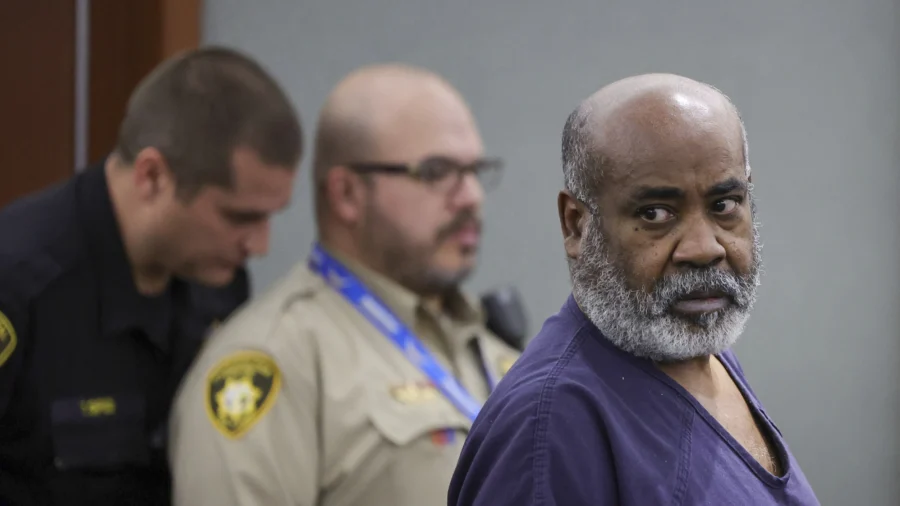LAS VEGAS—A Nevada judge is being asked to decide Tuesday if a former Los Angeles-area gang leader will be freed from jail to house arrest ahead of his murder trial in the 1996 killing of hip-hop music legend Tupac Shakur in Las Vegas.
Duane “Keffe D” Davis, now 61, has sought to be released since shortly after his arrest last September made him the only person ever charged with a crime in a killing that for 27 years has drawn intense interest and speculation.
Prosecutors allege the gunfire that killed Shakur stemmed from competition between East Coast members of a Bloods gang sect and West Coast groups of a Crips sect, including Mr. Davis, for dominance in a musical genre known at the time as “gangsta rap.”
Mr. Davis’ defense attorney, Carl Arnold, declined by telephone Monday to speak ahead of a hearing before Clark County District Court Judge Carli Kierny in Las Vegas.
The judge has said Mr. Davis—a self-described former leader of a Crips gang sect in the Los Angeles suburb of Compton, California—can be freed on $750,000 bond if he can demonstrate that funds used to secure his release were obtained legally.
Representatives at Crum & Forster Insurance and North River Insurance Co., the Morristown, New Jersey-based backer of the bond identified in the court filing, have not responded to telephone messages from The Associated Press.
Mr. Davis told Judge Kierny in court in February that backers were “hesitant to come in here and help me out on the bail because of the media and the circus that’s going on.”
Judge Kierny’s decision in January to set a bail amount came after prosecutors and Mr. Davis’ defense lawyers traded allegations about whether the word “green light” recorded by authorities monitoring an October jailhouse telephone conversation between Mr. Davis and his son was evidence of threats to witnesses in the case, or showed danger faced by Mr. Davis’ family members.
Mr. Davis has pleaded not guilty to first-degree murder. His trial is scheduled for Nov. 4. If convicted, he could spend the rest of his life in prison. Public defenders who represented Mr. Davis before he hired Mr. Arnold said in December he wasn’t getting proper medical care in jail following a bout with colon cancer that they said was in remission.
According to police, prosecutors, and Mr. Davis’ own accounts, he is the only person still alive among four people who were in a white Cadillac from which shots were fired in September 1996, mortally wounding Shakur and grazing rap mogul Marion “Suge” Knight at an intersection just off the Las Vegas Strip. Mr. Knight, now 59, is serving 28 years in a California prison for using a vehicle to kill a Los Angeles-area man in 2015.
Mr. Davis’ nephew, Orlando “Baby Lane” Anderson, who was in the back seat of the Cadillac, denied involvement in Shakur’s death and died in a May 1998 shooting in Compton. The other back seat passenger, DeAndre “Big Dre” or “Freaky” Smith, died in 2004. The driver, Terrence “Bubble Up” Brown, died in a 2015 shooting in Compton.
Mr. Davis has publicly described himself as the orchestrator of the shooting, but not the gunman. A renewed push by Las Vegas police to solve the case led to a search warrant and raid last July at his home in Henderson.
Prosecutors say they have strong evidence to convict Mr. Davis of murder based his own accounts during multiple police and media interviews since 2008—and in a 2019 memoir of his life leading a Compton street gang.
In his book, Mr. Davis wrote he was promised immunity to tell authorities in Los Angeles what he knew about the fatal shootings of Shakur and rival rapper Christopher Wallace six months later in Los Angeles. Wallace was known as The Notorious B.I.G. or Biggie Smalls.
Mr. Arnold maintains that Mr. Davis told stories so he could make money, and that police and prosecutors in Nevada lack key evidence including the gun, the Cadillac, and proof that Mr. Davis was in Las Vegas at the time of the shooting.
By Ken Ritter


